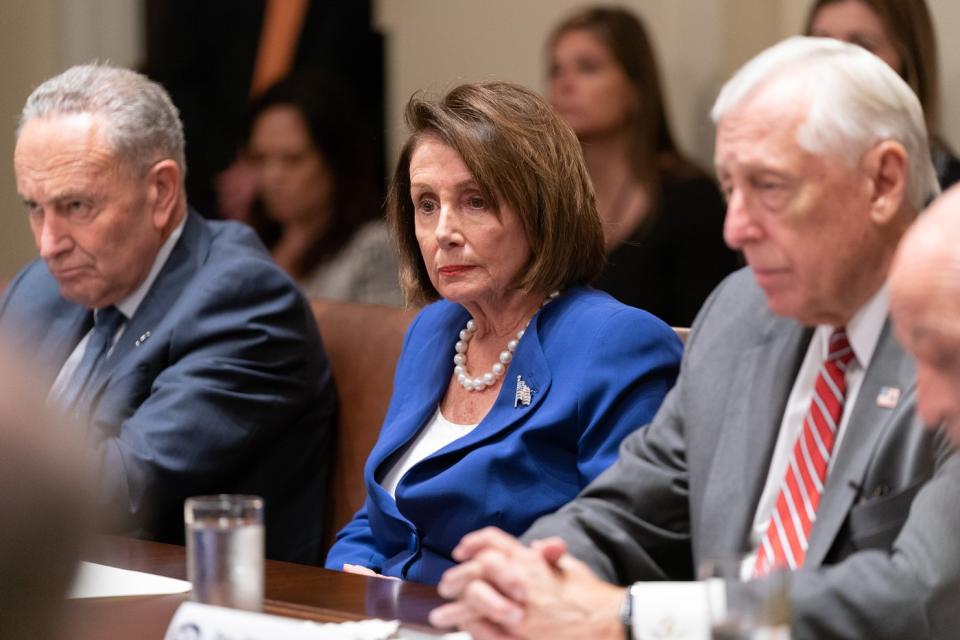Former House Speaker Nancy Pelosi Can't Stop Buying the 1 Artificial Intelligence (AI) Stock Billionaires Have Been Eager to Sell
Since the advent of the internet roughly three decades ago, more than a dozen next-big-thing investment trends and innovations have vied for Wall Street's attention. However, none of these innovations have inspired investors quite like the artificial intelligence (AI) revolution.
When discussing "AI," I'm talking about the broad definition of utilizing software and systems to oversee tasks that would normally be assigned to humans. What makes AI such a potential game-changer for corporate America is machine learning, which allows these systems to evolve over time, without human intervention, to become more effective at their assigned tasks, and/or learn new tasks.
It's very easy to be inspired by AI from an investment standpoint when analysts are casually tossing out the "t" word (trillions) to describe its potential. According to a 2023 report from PwC, artificial intelligence can provide a $15.7 trillion lift to the global economy by the turn of the decade.
Seemingly every investor wants exposure to the rise of AI -- and this includes members of Congress.

Nancy Pelosi is piling into the "infrastructure backbone" of the AI movement
Thanks to the STOCK Act, which was passed in 2012, lawmakers on Capitol Hill are required to report their trades of $1,000 or more no later than 45 days after they're completed. These periodic trading reports show that Democrats, on average, outperformed their Republican colleagues in the return column last year (31.18% vs. 17.99%).
The key to this outperformance was technology stocks, which were disproportionately owned by Democrats in the House and Senate.
However, Former Speaker of the House Nancy Pelosi (D-CA) has proven that she's no ordinary Democrat when it comes to beating the benchmark S&P 500. Whereas the S&P 500 gained more than 24% last year, the "Congressional Trading 2023" report from Unusual Whales estimates that Nancy Pelosi's portfolio increased by more than 65%. Beating the broader market has become something of the norm for Pelosi.
Although the former House Speaker and her venture capitalist husband Paul Pelosi have primarily invested in industry-leading, megacap businesses, it's multiple timely investments in the infrastructure backbone of the AI movement, semiconductor behemoth Nvidia (NASDAQ: NVDA), which have fueled this outperformance.
While there's been some modest profit-taking along the way, Pelosi's periodic transaction reports, via Capitol Trades, shows:
A call option purchase of $250,000 to $500,000 of Nvidia stock on July 23, 2021.
A common stock purchase of $500,000 to $1 million of Nvidia stock on July 23, 2021.
A common stock purchase of $1 million to $5 million of Nvidia stock on July 26, 2022.
The purchase of $1 million to $5 million of Nvidia $120 strike call options on Nov. 22, 2023.
The most recent options trade has been particularly fruitful for Pelosi, with the value of these contracts increasing by almost $2 million in less than five months.
Nvidia's growth trajectory is unlike anything we've ever witnessed from a megacap company
Nvidia's ascension from a $360 billion company at the start of 2023 to the third-largest publicly traded company, with a market cap of almost $2.2 trillion, as of April 16, is the result of its graphics processing units (GPUs) taking the world by storm.
Though estimates vary, Nvidia's A100 and H100 GPUs are expected to account for approximately 90% of the GPUs deployed in AI-accelerated data centers this year. Nvidia's infrastructure is the "brains" that are helping to train large language models and oversee generative AI solutions.
On top of its monopoly like market share in high-compute data centers, Nvidia has attracted orders from virtually all of the most-influential tech companies on Wall Street. "Magnificent Seven" members Microsoft, Meta Platforms, Amazon, and Alphabet account for around 40% of its net sales. Meta alone is spending in the neighborhood of $10 billion to order 350,000 H100 GPUs for its data centers.
Soaring demand has been especially beneficial to Nvidia's pricing power. The law of supply and demand states that if the supply of an in-demand good or service is limited, the price for that good or service will rise until demand tapers. In fiscal 2024 (ended Jan. 28, 2024), Nvidia's data center sales climbed 217%, all while its cost of revenue rose (across all segments) by a more modest 43%. This makes it clear that the bulk of Nvidia's data center sales growth came from its otherworldly pricing power.
After recording roughly $27 billion in full-year sales in fiscal 2023, Nvidia more than doubled its revenue to almost $61 billion last year. If Wall Street's consensus estimates are anywhere in the ballpark, Nvidia is expected to deliver $110 billion in sales this year and close to $138 billion in fiscal 2026.
We've simply never witnessed a company as large as Nvidia sustain this level of growth.

Nvidia has eight prominent billionaire investors running for the exit
While it's clear the former House Speaker and her husband like what they see from Nvidia, more than a half-dozen prominent billionaire investors can't sell shares of the company fast enough. Form 13F filings with the Securities and Exchange Commission for the December-ended quarter show that eight highly successful billionaires sold shares, including (total shares sold in parenthesis):
Israel Englander of Millennium Management (1,689,322 shares)
Jeff Yass of Susquehanna International (1,170,611 shares)
Steven Cohen of Point72 Asset Management (1,088,821 shares)
David Tepper of Appaloosa Management (235,000 shares)
Philippe Laffont of Coatue Management (218,839 shares)
Chase Coleman of Tiger Global Management (142,900 shares)
John Overdeck and David Siegel of Two Sigma Investments (30,663 shares)
One probable reason for these eight billionaires to go against the grain is history. Every next-big-thing investment trend for three decades, including the internet, has worked its way through an early innings bubble. Regardless of the innovation, investors have a terrible habit of overestimating the adoption and uptake of new technologies. If history rhymes, once again, the AI bubble is going to burst. No company has benefited more directly from the AI revolution than Nvidia. Thus, it may have the most to lose if the bubble pops.
A strong argument can also be made that Nvidia is its own worst enemy. Nvidia increasing production of its AI-GPUs, coupled with the entrance of Advanced Micro Devices and Intel with high-powered GPUs of their own, could quickly reduce the scarcity that drove AI-GPU prices into the stratosphere. In short, Nvidia's pricing power and gross margin should decline.
Perhaps the biggest worry for Nvidia, and the reason eight billionaires reduced their fund's respective stakes during the fourth quarter, is that the company's top-four customers are all developing in-house GPUs for their data centers. This internal innovation is almost certain to result in reduced future orders from Nvidia.
Despite Nancy Pelosi's phenomenal track record of outpacing the S&P 500, both the actions of these eight billionaires, along with historic precedence, suggest Nvidia stock may be in a bubble.
Should you invest $1,000 in Nvidia right now?
Before you buy stock in Nvidia, consider this:
The Motley Fool Stock Advisor analyst team just identified what they believe are the 10 best stocks for investors to buy now… and Nvidia wasn’t one of them. The 10 stocks that made the cut could produce monster returns in the coming years.
Consider when Nvidia made this list on April 15, 2005... if you invested $1,000 at the time of our recommendation, you’d have $466,882!*
Stock Advisor provides investors with an easy-to-follow blueprint for success, including guidance on building a portfolio, regular updates from analysts, and two new stock picks each month. The Stock Advisor service has more than quadrupled the return of S&P 500 since 2002*.
*Stock Advisor returns as of April 18, 2024
Suzanne Frey, an executive at Alphabet, is a member of The Motley Fool's board of directors. John Mackey, former CEO of Whole Foods Market, an Amazon subsidiary, is a member of The Motley Fool's board of directors. Randi Zuckerberg, a former director of market development and spokeswoman for Facebook and sister to Meta Platforms CEO Mark Zuckerberg, is a member of The Motley Fool's board of directors. Sean Williams has positions in Alphabet, Amazon, Intel, and Meta Platforms. The Motley Fool has positions in and recommends Advanced Micro Devices, Alphabet, Amazon, Meta Platforms, Microsoft, and Nvidia. The Motley Fool recommends Intel and recommends the following options: long January 2025 $45 calls on Intel, long January 2026 $395 calls on Microsoft, short January 2026 $405 calls on Microsoft, and short May 2024 $47 calls on Intel. The Motley Fool has a disclosure policy.
Former House Speaker Nancy Pelosi Can't Stop Buying the 1 Artificial Intelligence (AI) Stock Billionaires Have Been Eager to Sell was originally published by The Motley Fool

 Yahoo Finanzas
Yahoo Finanzas 